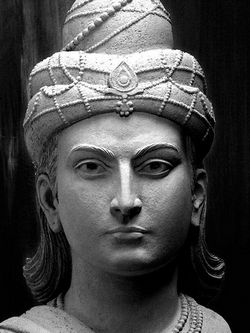
Ashoka, also known as Asoka or Aśoka ( ə-SHOH-kə; Sanskrit pronunciation: [ɐˈɕoːkɐ], IAST: Aśoka; c. 304 – 232 BCE), and popularly known as Ashoka the Great, was Emperor of Magadha from c. 268 BCE until his death in 232 BCE, and the third ruler from the Mauryan dynasty. His empire covered a large part of the Indian subcontinent, stretching from present-day Afghanistan in the west to present-day Bangladesh in the east, with its capital at Pataliputra. A patron of Buddhism, he is credited with playing an important role in the spread of Buddhism across ancient Asia.
Ashoka's edicts state that during his eighth regnal year (c. 260 BCE), he conquered Kalinga after a brutal war. Ashoka subsequently devoted himself to the propagation of "dhamma" or righteous conduct, the major theme of the edicts. Ashoka's edicts suggest that a few years after the Kalinga War, he was gradually drawn towards Buddhism. The Buddhist legends credit Ashoka with establishing a large number of stupas, patronising the Third Buddhist council, supporting Buddhist missionaries, making generous donations to the sangha.
Ashoka's existence as a historical emperor had almost been forgotten, but since the decipherment in the 19th century of sources written in the Brahmi script, Ashoka holds a reputation as one of the greatest Indian emperors. The State Emblem of the modern Republic of India is an adaptation of the Lion Capital of Ashoka. Ashoka's wheel, the Ashoka Chakra, is adopted at the centre of the National Flag of India.
Source : Wikipedia